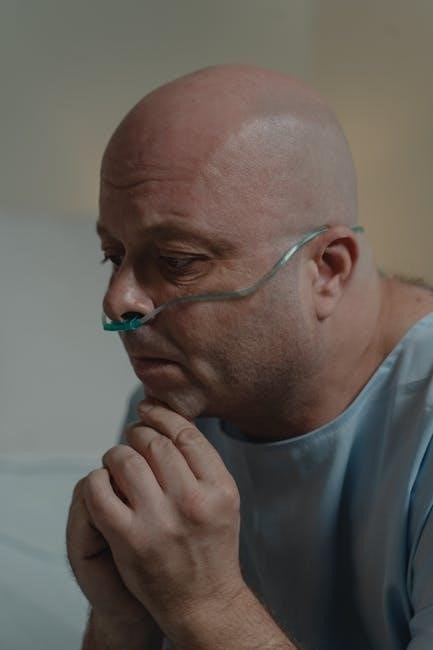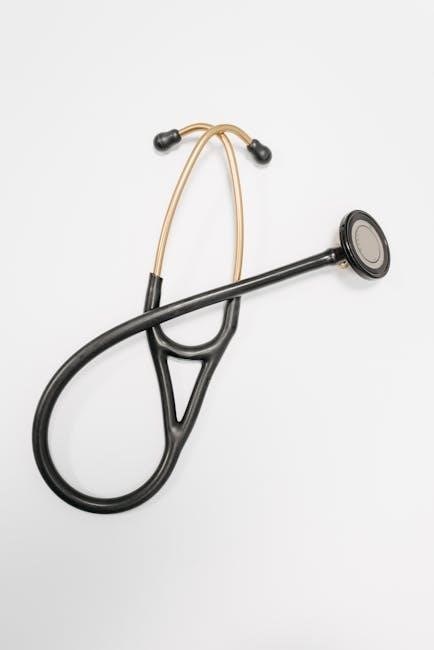Overview of Mental Health Nursing Textbooks in PDF Format
Mental health nursing textbooks in PDF format offer accessible resources for students and professionals․ These electronic books provide comprehensive knowledge on psychiatric care, theories, and therapeutic interventions․ Free downloads and affordable print versions enhance learning․
Mental health nursing is a specialized field focused on the holistic care of individuals experiencing mental health conditions․ It integrates compassion, sensitivity, and evidence-based practices to promote well-being․ Key concepts include understanding mental health versus mental illness, historical perspectives on treatment, and the role of nurses in community settings․
This field emphasizes the therapeutic nurse-client relationship as foundational to effective care․ Mental health nurses work to foster the physical and emotional welfare of individuals, considering their family and community contexts․ They assess clients, implement interventions, and collaborate with interdisciplinary teams to deliver comprehensive care․
Textbooks introduce students to foundational concepts, theories, and legal/ethical considerations within mental health nursing․ They accurately present various agencies and resources available for clients․ The integrated learning approach helps students apply theoretical knowledge to practice, strengthening their skills across nursing disciplines․

Free and Open Educational Resources (OER)
Open Educational Resources (OER) provide free access to mental health nursing textbooks․ These resources promote affordable, high-quality learning․ Textbooks are available online or as downloadable PDFs for convenient use․
Open RN Project Overview
The Open RN project, supported by a $2․5 million grant, aims to create five free, open-source nursing textbooks․ This initiative addresses the need for accessible educational materials in nursing education․ Chippewa Valley Technical College leads the project within the Wisconsin Technical College System consortium․
Faculty collaboratively develop OER nursing textbooks and virtual simulations based on the WTCS State Nursing curriculum and NCLEX-RN Test Plan․ Textbooks undergo peer review by faculty, deans, industry members, and nursing students․ This ensures content accuracy, relevance, clarity, and evidence-based practices․ All Open RN materials have CC-BY 4․0 Creative Commons licensing, promoting adaptation and sharing․ The project also includes virtual reality scenarios and simulations․
The Open RN project created 25 Virtual Reality Scenario Plans with CC-BY 4;0 licensing for use during immersive VR learning experiences provided in the Acadicus platform․ These scenarios utilize VR headsets and hand controllers during patient care simulations to promote the development of clinical judgment․
Availability of Free Textbook Downloads
Open RN textbooks are published in Pressbooks, where they are freely accessible in online and downloadable formats․ This allows students and educators to access materials without cost barriers․ The textbooks are also uploaded to LibreTexts, facilitating remixing by faculty to align with their curriculum․
The availability of free textbook downloads promotes equitable access to high-quality educational resources․ By removing financial barriers, students can focus on learning rather than worrying about textbook costs․ Educators can customize and adapt the materials to suit their specific teaching needs․ This ensures that the content remains relevant and up-to-date․
The Open RN project’s commitment to open educational resources enhances the learning experience for nursing students․ It supports their academic success by providing accessible, customizable, and high-quality textbooks and learning materials․ Free access ensures that all students have the opportunity to excel in their studies․
Open RN Textbook Titles
The Open RN project offers several free, open-source nursing textbooks designed to enhance nursing education․ These resources are available for online viewing and download, providing accessibility and flexibility for students and educators․ The textbooks cover a range of essential nursing topics, ensuring comprehensive knowledge and skills development․
Among the titles are “Mental Health & Community Concepts,” published in Fall 2022, focusing on key aspects of mental health and community nursing․ “Nursing Assistant,” published in January 2023, provides foundational knowledge for nursing assistants․ “Nursing Advanced Skills,” released in Spring 2023, delves into advanced nursing procedures․ “Nursing Skills” and “Nursing Pharmacology,” both second editions published in August 2023, offer updated insights into essential skills and pharmacology principles․
The project also includes titles like “Medical Terminology” (Second Edition, June 2024), “Nursing Fundamentals” (Second Edition, August 2024), “Management & Professional Concepts” (Second Edition, August 2024), and “Nursing Health Alterations” (August 2024)․ “Nursing Health Promotion” is anticipated in Spring 2025, completing the comprehensive suite of resources․

Key Concepts in Mental Health Nursing
Mental health nursing involves understanding foundational theories, building therapeutic relationships, and navigating legal and ethical considerations․ These core concepts are crucial for providing effective and compassionate care in mental health settings․
Foundational Concepts and Theories

Understanding the historical context of mental health treatment is essential․ Key figures and their contributions shape modern approaches․ Grasping the distinction between mental health and mental illness provides a crucial framework․

Neurobiologic theories explore the physiological basis of mental disorders, complemented by psychosocial theories that consider social and environmental factors․ Psychopharmacology, the study of medications, forms a vital part of treatment strategies․
Exploring various treatment settings, from inpatient units to community programs, is necessary․ Understanding different therapeutic programs, like cognitive behavioral therapy (CBT) and dialectical behavior therapy (DBT), allows for tailored care․
These foundational elements empower nurses to provide holistic care․ Integrating theoretical knowledge with practical application strengthens their ability to address diverse mental health needs effectively and ethically, promoting recovery and well-being․
Therapeutic Nurse-Client Relationship

Building a strong therapeutic relationship is paramount in mental health nursing․ Essential components include empathy, respect, and genuineness․ Establishing trust is crucial for effective communication and collaboration․
Nurses must employ active listening skills to understand the client’s perspective․ Clear and concise communication fosters a safe and supportive environment․ Maintaining professional boundaries ensures ethical and appropriate interactions․
Understanding transference and countertransference dynamics enhances self-awareness․ Nurses must recognize their own biases and emotional responses․ This awareness promotes objectivity and prevents harmful interactions․
The therapeutic relationship serves as a foundation for assessment, intervention, and evaluation․ By prioritizing the client’s needs and promoting autonomy, nurses empower individuals to actively participate in their recovery journey, leading to improved mental health outcomes and enhanced well-being․
Legal and Ethical Considerations
Mental health nursing involves complex legal and ethical considerations․ Nurses must understand patient rights, including confidentiality and informed consent․ Adherence to legal standards ensures ethical practice and protects patient autonomy;
Issues such as involuntary commitment and the right to refuse treatment require careful navigation․ Nurses must balance patient autonomy with the duty to protect individuals from harm․ Ethical decision-making frameworks guide nurses through dilemmas․
Maintaining accurate and confidential documentation is essential․ Legal and ethical standards mandate proper record-keeping practices․ Understanding the nuances of HIPAA and other privacy regulations is crucial․
Nurses must advocate for patients’ rights while upholding professional responsibilities․ Collaboration with interdisciplinary teams ensures comprehensive and ethical care․ Continuous education on legal and ethical updates is vital for competent practice, safeguarding both patients and nurses within the mental health system․

Specific Mental Health Nursing Topics
This section explores specific areas within mental health nursing, including community mental health, crisis intervention, and lifespan considerations․ Each topic provides essential knowledge for effective and compassionate care delivery to diverse populations․

Community Mental Health Nursing
Community mental health nursing focuses on providing care outside traditional hospital settings, emphasizing prevention and early intervention․ Nurses in this field work within communities, addressing mental health needs in homes, schools, and local clinics․ This approach aims to integrate mental health care into everyday life, reducing stigma and promoting accessibility․
Community mental health nurses collaborate with various agencies and resources to support individuals’ physical and emotional welfare․ They assess community needs, develop targeted programs, and advocate for policies that improve mental health services․ Their role is crucial in fostering a holistic approach to care, considering the individual within their family and community context․
Effective community mental health nursing requires cultural sensitivity, strong communication skills, and the ability to build trusting relationships․ Nurses must be adept at navigating complex social systems and advocating for vulnerable populations․ This field offers unique opportunities to make a significant impact on individuals’ lives and the overall well-being of communities․
Crisis Intervention and Suicide Prevention
Crisis intervention and suicide prevention are critical components of mental health nursing․ Nurses play a vital role in assessing individuals at risk, providing immediate support, and implementing strategies to ensure safety․ This area of nursing requires specialized knowledge and skills to effectively manage acute mental health emergencies․
Crisis intervention involves rapid assessment, stabilization, and problem-solving to help individuals regain control during overwhelming situations․ Nurses use therapeutic communication techniques, such as active listening and empathy, to build rapport and de-escalate crises․ Suicide prevention strategies include identifying warning signs, assessing risk factors, and developing safety plans․
Nurses must be knowledgeable about available resources, including crisis hotlines, mental health services, and community support systems․ Collaboration with interdisciplinary teams, including psychiatrists, social workers, and counselors, is essential for comprehensive care․ Crisis intervention and suicide prevention require ongoing education and training to stay current with best practices and emerging trends․
Mental Health Care Across the Lifespan
Mental health care across the lifespan encompasses the unique challenges and considerations for individuals at different developmental stages․ From infancy to older adulthood, mental health needs vary significantly, requiring tailored approaches to assessment, intervention, and support․ Nurses play a crucial role in providing comprehensive care that addresses these diverse needs․
In children and adolescents, mental health issues may manifest differently than in adults, often presenting as behavioral problems, academic difficulties, or social withdrawal․ Early identification and intervention are essential to promote healthy development and prevent long-term consequences․ Adults may experience a range of mental health disorders, including depression, anxiety, and substance abuse, which can impact their personal, social, and occupational functioning․
Older adults face unique challenges related to aging, such as cognitive decline, chronic illness, and social isolation, which can contribute to mental health problems․ Nurses must be knowledgeable about age-related changes and adapt their care accordingly․ Providing culturally sensitive and age-appropriate care is vital to ensuring positive mental health outcomes across the lifespan․

Resources and Tools
A range of resources and tools support mental health nursing education and practice․ These include virtual reality scenarios, NCLEX Next Generation questions, and open educational resources․ These tools enhance learning and skill development․
Virtual Reality Scenarios and Simulations

Virtual reality (VR) scenarios offer immersive learning experiences in mental health nursing․ The Open RN project, supported by the Department of Education, created 25 VR scenario plans under Creative Commons licensing․ These scenarios utilize VR headsets and hand controllers to simulate patient care, promoting the development of clinical judgment in a safe, controlled environment․
In addition to VR scenarios, the Open RN project developed over 30 free, screen-based virtual simulations accessible on any device with internet․ These simulations provide immediate formative feedback, further enhancing clinical judgment skills․ These simulations, created in H5P with Creative Commons licensing, are integrated into Open RN OER textbooks․
These tools are designed to bridge the gap between theoretical knowledge and practical application, giving students and professionals opportunities to practice skills and decision-making in realistic, interactive settings․
NCLEX Next Generation (NGN) Question Resources
The Next Gen RN project, funded by a WTCS grant, focuses on improving pre-licensure nurses’ preparedness by providing practice with NCLEX Next Generation (NGN) questions․ These questions, launched in April 2023, assess clinical judgment more accurately․ LibreTexts ADAPT platform is customized for nursing faculty to create and share NGN-style case studies and questions publicly․
Over 25 NGN-style case studies are available in the Next Gen RN public course in ADAPT; Nursing instructors can request an ADAPT account to view these questions․ Individual NGN questions are also linked within Open RN OER textbooks as formative assessments, providing students with immediate feedback․
These resources aim to familiarize nursing students with the new question format and improve their ability to apply critical thinking skills in clinical scenarios, ultimately enhancing their readiness for the NCLEX examination and professional practice․
